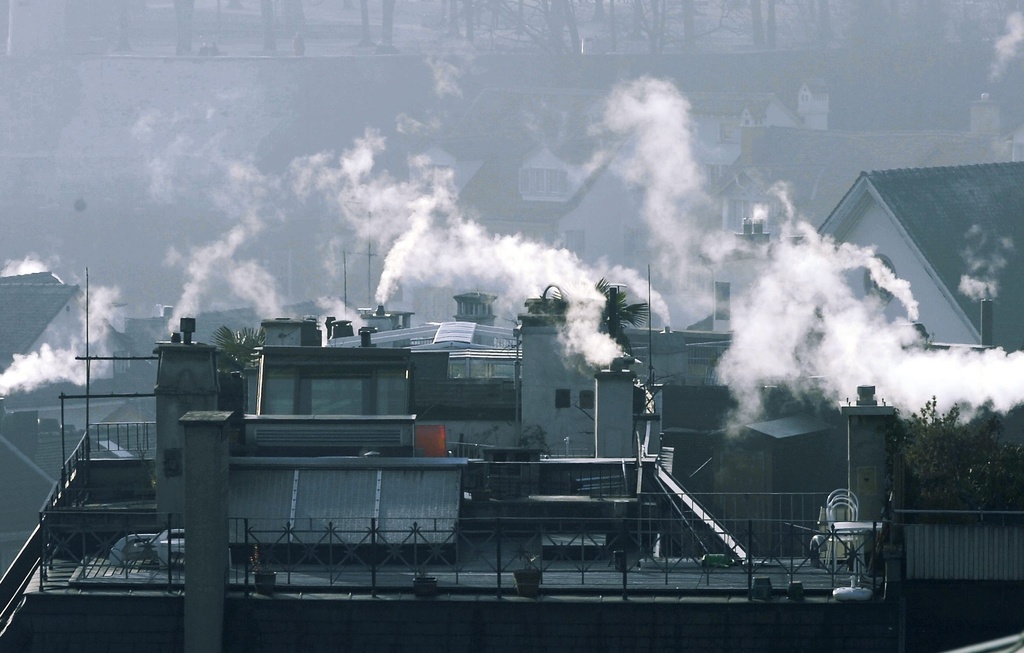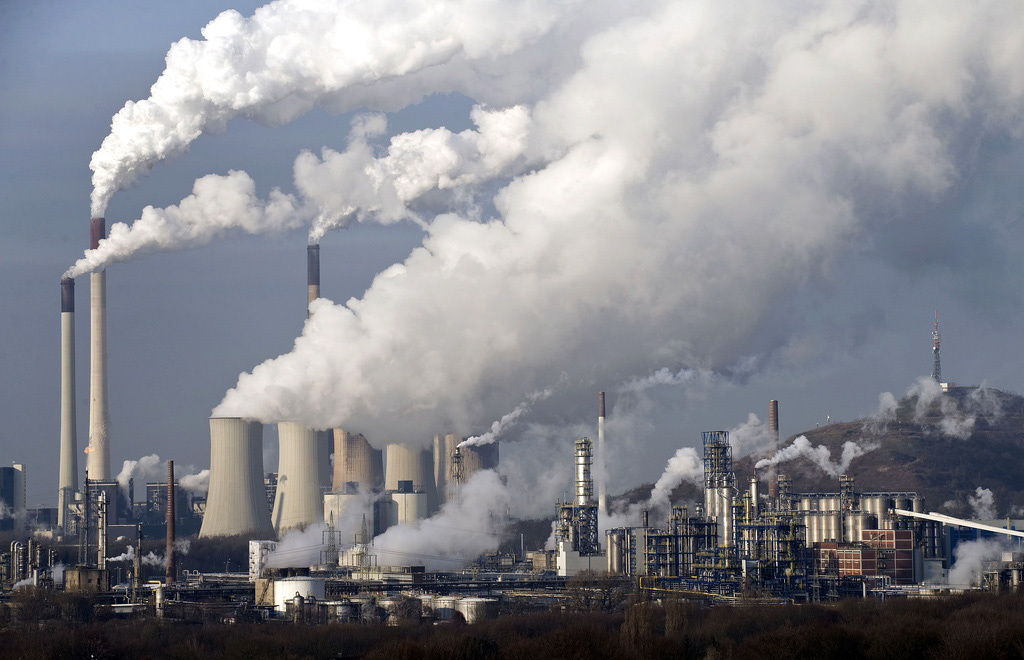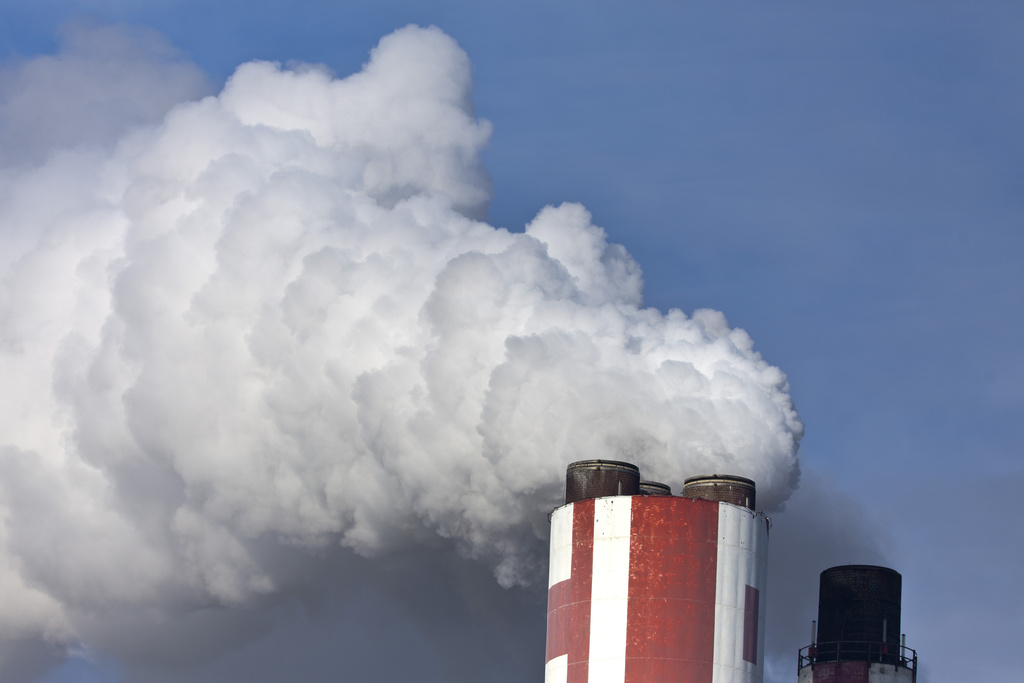Revised CO2 law reflects uneasy compromise

Parliament has agreed to reduce carbon emissions by 20 per cent by 2020 but has voted against introducing a tax on petrol to help it do so.
The compromise reached by both chambers during the current winter session is a response to a people’s initiative launched by environmental groups in 2007 which calls for a 30 per cent reduction on 1990 levels of carbon dioxide emissions by 2020.
In concrete terms, the revision of the law on CO2 calls for 10.5 million tonnes less carbon dioxide to be emitted in Switzerland by 2020 than in 1990. Of this, business will be responsible for 800,000 tonnes.
Other reductions will be achieved by the use of more energy efficient cars and upgrading road infrastructure, while the government will have the power to increase the existing tax on emissions from heating oil from the current SFr36 ($38.50) per carbon tonne by up to SFr120 per tonne.
The deal will see half of all carbon dioxide emissions produced by gas-fuelled power stations compensated for in Switzerland, with the remainder to be compensated for internationally through the purchase of carbon credits for international schemes.
Parliament will take a final vote on the revision of the CO2 law on Friday, and while business groups remain unhappy with the new law, it now appears unlikely they will call for a referendum to challenge its introduction.
Effects
Dominique Reber, a spokesman for the Swiss Business Federation, economiesuisse, said his organisation would meet before the weekend to decide its response. He said the probability the group would call for a referendum had been “well reduced” by the parliament having maintained two key measures from the old law.
The first, said Reber, was allowing businesses to compensate for their emissions through the purchase of carbon credits on international markets, and the second was the exemption from the carbon tax for small and medium-sized enterprises (SMEs) who show they are voluntarily moving to reduce their carbon emissions.
“That ensures that Switzerland will be able to compete in the international economy,” Reber told swissinfo.ch.
“It’s important to underline that this is not an emotional debate, this is a debate based on the effects. We are going to calculate what this new law cost compared with what the opportunities are – and there are opportunities, that is clear – and if the balance is positive, then we will not call for a referendum.”
Imperfect compromise
Henrique Schneider, a spokesman for SME umbrella group, said that although the organisation was not in favour of changing the existing law, concessions had been made to protect small business.
“In principle, we are not in favour of the CO2 law. We think it will have diverse difficulties for the whole economy, not just for SMEs,” Schneider told swissinfo.ch.
“But in the end, we have to recognise that concessions have been made especially for the SMEs, so we will accept this compromise. It’s not great, but we will accept it.”
The WWF’s Patrick Hofstetter told swissinfo.ch the revised law was a “typical Swiss compromise”.
He said the move to exclude a petrol tax was designed to avoid the issue being taken to referendum, which could have killed off the law altogether. He said it was possible to achieve the 20 per cent emissions reduction target without an additional petrol tax.
“The government has already announced that it would like to increase the existing petrol tax to finance infrastructure, so there will be a mechanism outside the CO2 law to increase the petrol price,” Hofstetter said.
He said a committee would decide in February whether it would withdraw its people’s initiative in response to the parliament’s compromise deal or to bring it to a vote asking for a 30 per cent reduction in emissions.
New momentum
Four years in the making, the revised law on carbon emissions reflects a new momentum on the part of political decision-makers to increase its efforts to combat climate change.
“In an ideal world, the best thing would have been to prolong the current law, but politically, after the last two- and-a-half years, they needed this law to show that they are doing something about the climate,” the SME’s Schneider said.
Hofstetter said several measures included in the law gave the government the power over implementation without needing parliament’s approval.
He said there had been several indications over the past year, including the decision to abandon nuclear power, that the government was serious about effective measures to combat climate change.
“I think they will come up with a reasonable proposal on implementing this,” Hofstetter said, adding that parliament was “slightly greener” following recent elections.
“The revised law is not what we have been asking for, but it is clearly more ambitious than what the government was proposing two years ago, so in a way parliament was more ambitious and it’s certainly a good sign. It’s not enough, but it’s a good sign.”
As a signatory to the Kyoto Protocol, Switzerland in 1997 committed itself to reducing greenhouse gas emissions.
In an initial phase, CO2 emissions were to be reduced by 10% over 1990 levels by 2010.
In 2007, environmental groups launched a popular initiative calling for a 30 per cent reduction in emissions and collected enough signatures to force a nationwide vote.
In response, the government proposed revising the CO2 law to raise the target to at least a 20% cut in emissions by 2020, partly through a CO2 tax, an emissions trading system and compensation measures outside Switzerland.
Parliament approved the 20% target, but initially wanted the cuts to be achieved through measures within Switzerland only. This was dropped in the compromise deal that was accepted by both houses of parliament, as was a government proposal to tax petrol as a means of reducing emissions.
The EU, which does not include Switzerland, has also set a 20% emission cut. The 27-nation bloc has set targets for individual member countries and approved a number of measures.

In compliance with the JTI standards
More: SWI swissinfo.ch certified by the Journalism Trust Initiative




You can find an overview of ongoing debates with our journalists here. Please join us!
If you want to start a conversation about a topic raised in this article or want to report factual errors, email us at english@swissinfo.ch.